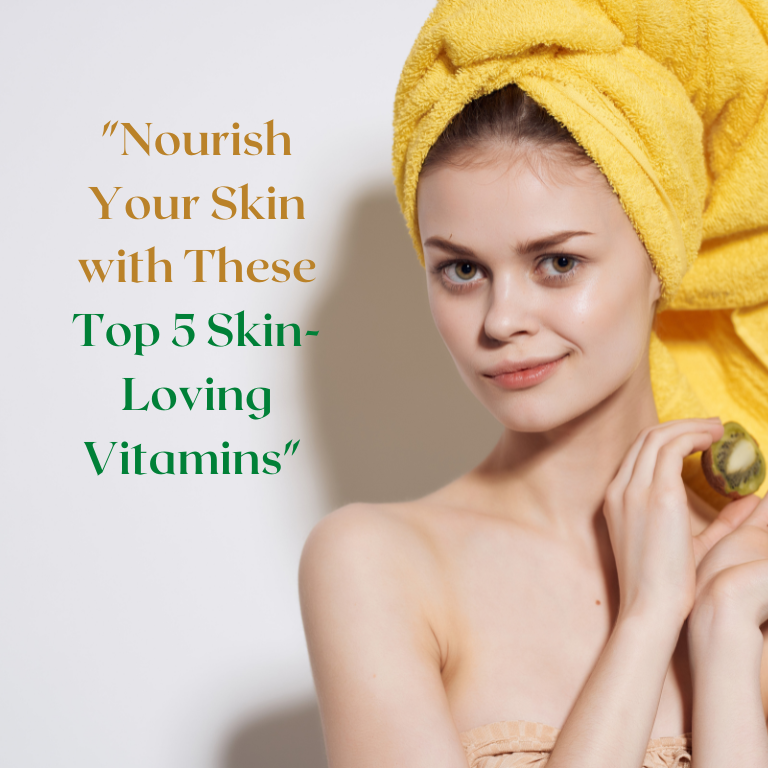
“Nourish Your Skin with These Top 5 Skin-Loving Vitamins”
“Do you want to achieve radiant, healthy skin? Look no further than your daily vitamins!

Our skin requires certain nutrients to function at its best, and incorporating these key vitamins into your diet and skin care routine can make a huge difference in the appearance and health of your skin. From boosting hydration to fighting free radicals, these top 5 skin-loving vitamins are a must-have for anyone looking to nourish their skin from the inside out. Read on to find out which vitamins you should be incorporating into your routine.”
Vitamin A
Vitamin A is an essential vitamin for the human body.
Your body needs this vitamin to work correctly and maintain healthy organs, vision, immune system, and reproduction.

It’s involved in producing fresh, new cells, which means it maintains skin health and also helps it look younger and youthful.
Vit A – Normalizes the activity of melanogenesis (i.e., the production of melanin in the skin); therefore, it helps regulate skin color.
- It helps maintain the skin’s health, especially the dermis & epidermis.
- It stimulates fibroblasts to synthesize collagen and elastin & protects collagen against degradation; hence it makes your skin firmer.
- It influences skin thickness; Protects the skin against UV radiation
- Reduces sebum and limits the development of certain types of acne
- Vitamin A, when applied topically, significantly influences skin health.
Retinoids are the compounds that derive from vitamin A Trusted Sources. This means that they possess structural or functional similarities to vitamin A.
Retinoids can be taken orally or applied topically in the form of creams, gels, or lotions.
Topically applied retinoids reduce the discoloration of the skin and its pigmentation by about 60%.
Retinoids also affect the thickness and color of the skin, regulate the function of the sebaceous glands, limit sebum production, be responsible for hair and nail growth, and influence the distribution of melanin in the skin.
Sources Of Vit A: liver, fish liver oils, dairy products, butter, cheese, egg yolk, meat products, certain saltwater fish, and plant products like green leafy veggies, tomatoes & bell peppers.
The recommended daily amount of vitamin A is 900 micrograms (mcg) for adult men and 700 mcg for adult women.
Vitamin C (L-ascorbic acid) is a highly water-soluble vitamin.

The human body does not naturally synthesize vitamin C; therefore, adequate dietary intake of vitamin C is required and essential for a healthy human diet.
- Vitamin C promotes the formation of the epidermal barrier and collagen in the dermis, protects against skin oxidation & even helps to counteract skin aging.
- The antioxidant properties of vitamin C protect the skin, especially the epidermis, against oxidants generated by ultraviolet radiation and other environmental factors.
- The photoprotective efficacy of vitamin C is enhanced by combining it with vitamin E.
- Numerous scientific papers emphasize the potential of vitamin C for the treatment of such diseases as atopic dermatitis, malignant melanoma, herpes zoster, acne, acne scars, allergic contact dermatitis, and vitiligo.
- -influences skin hydration
- -inhibits melanogenesis
- -protects against UV radiation, i.e., protects against photoaging
- Improves skin fragility by assisting in collagen biosynthesis
Sources of Vit C:
Citrus fruits, seaberry, dog-rose, blackcurrant, strawberry, raspberry, kiwi, hawthorn, rowan, cruciferous vegetables (Brussels sprouts, kohlrabi, broccoli, cabbage, cauliflower), spinach, chicory, green bean, red pepper, chives, parsley, nettle, five-flavor berry, oregano –
Deficiency can lead to :
-thickening of the stratum corneum layer –the outermost layer of the epidermis
-impaired wound healing
-subcutaneous bleeding
-scurvy
The recommended daily amount for vitamin C is 75 milligrams (mg) daily for women and 90 mg a day for men. 120 mg a day is recommended during pregnancy, and the upper limit for all adults is 2,000 mg a day.
Fun fact – Vitamin C and vitamin E act synergistically.
Vitamin C and vitamin E are both antioxidants that work together to protect cells from damage caused by free radicals. Vitamin C helps to regenerate vitamin E after it has been oxidized, while vitamin E helps to protect vitamin C from oxidation. Together, they can provide greater antioxidant protection than either vitamin alone.
Vitamin E
Vitamin E is not a single but complex vitamin- it is a group of 8 compounds called tocopherols.

Vitamin E is exclusively synthesized by plants, and all forms are supplied to the human body by food.
Natural vitamin E in food is often listed as d-alpha-tocopherol on food labels, and vitamin E is also produced synthetically.
The synthetic form of vitamin E is often referred to as dl-alpha-tocopherol, but the natural vitamin E is more potent than its synthetic version.
Vitamin E can be absorbed even better when combined with vitamin C.
Research also indicates that vitamin E displays strong photoprotective, firming, hydrating and anti-aging properties and improves the epidermis’s elasticity, structure, and softness.
Vitamin E is a fat-soluble vitamin that acts as an antioxidant, helping protect cells from damage throughout your body. It’s found in our sebum (skin oil), which creates a natural barrier to keep moisture in your skin. So oilier skin surfaces, like the face, contain more significant amounts of vitamin E. And since people with oily skin have more sebum, they also have more vitamin E on their skin.
Sebum, along with vitamin E levels, naturally declines with age. Vitamin E is also depleted by ultraviolet light (UV) sources like:
- Sunlight.
- Tanning beds.
- Some fluorescent, halogen, and incandescent light bulbs.
Deficiency of Vit E can lead to Exfoliative dermatitis & skin inflammation.
Vitamin E Sources :
(tocopherol) wheat germ oil, sunflower oil, safflower oil, soybean oil, maize oil, cottonseed oil, palm oil, cereal products, nuts
The Recommended amount for vitamin E for males and females ages 14 years and older is 15 mg daily (or 22 international units, IU)
Taking supplements can be risky, however, as large doses of vitamin E can inhibit the ability of blood to clot when needed, causing severe bleeding. Bleeding in the brain (hemorrhagic stroke) may also result.
Vitamin D is often made when your skin absorbs sunlight, and cholesterol converts to vitamin D.

While it’s important to protect your skin from excessive sun exposure, a small amount of sunlight can be beneficial for your health. The skin can produce vitamin D when it’s exposed to UVB radiation from the sun, and this vitamin is important for maintaining healthy bones, teeth, and muscles. In addition to vitamin D, other vitamins such as vitamins C, E, and K can also be important for skin health. Vitamin C, for example, can help to boost collagen production and protect against skin damage from free radicals. Vitamin E is an antioxidant that can help to protect the skin from oxidative damage, while vitamin K may help to improve the appearance of dark circles under the eyes.
You can increase your vitamin D intake by:
- getting 10 minutes of sun exposure a day (check with your doctor first, especially if you have a history of skin cancer)
- eating fortified foods, such as breakfast cereals, orange juice, and yogurt
- Eat natural vitamin D foods like salmon, tuna, cod, and mushrooms.
Zinc
Zinc (Zn) is an essential microelement with an important role in many physiological processes.

A deficiency can cause several health problems, so it is crucial to ensure an adequate intake, mainly through a balanced diet containing both animal and plant products, but also by addressing factors that can impede the absorption of this element.
Zinc is used to treat numerous dermatological conditions, such as infections (e.g., warts), inflammatory dermatoses (acne vulgaris, rosacea, atopic dermatitis, and alopecia areata), and pigmentary disorders (melasma).
(Zn) red meat, fish, poultry, seafood (shrimp, oysters), nuts, pumpkin seeds, sunflower seeds, legumes, whole grains, and dairy products
prevents UV-induced skin damage
Protects against photodamage
The Recommended Daily intake of zinc for adults 19+ years is 11 mg a day for men and 8 mg for women.
So, in conclusion, promoting healthy dietary habits can benefit the appearance of the skin, delay aging processes and reduce the risk of skin cancer.
Do you know my book on Natural & Holistic Healing of Hyperpigmentation is now available? I’m sharing the link in the description box- have a read & let me know how you find it.
Also, Body wash Naturo Essentials is available on Amazon for NewZealand & Australia – I have formulated it myself to provide a natural, herbal, and the gentlest body & hair wash for you all – check it out!
I hope you liked this blog; don’t forget to like, share & subscribe. This will encourage me to make more informative content for you all.
If you or your loved one is dealing with any skin issue and you would like a holistic & natural treatment, I might be able to help you- email me at
contact@naturalskin.clinic to discuss further.
